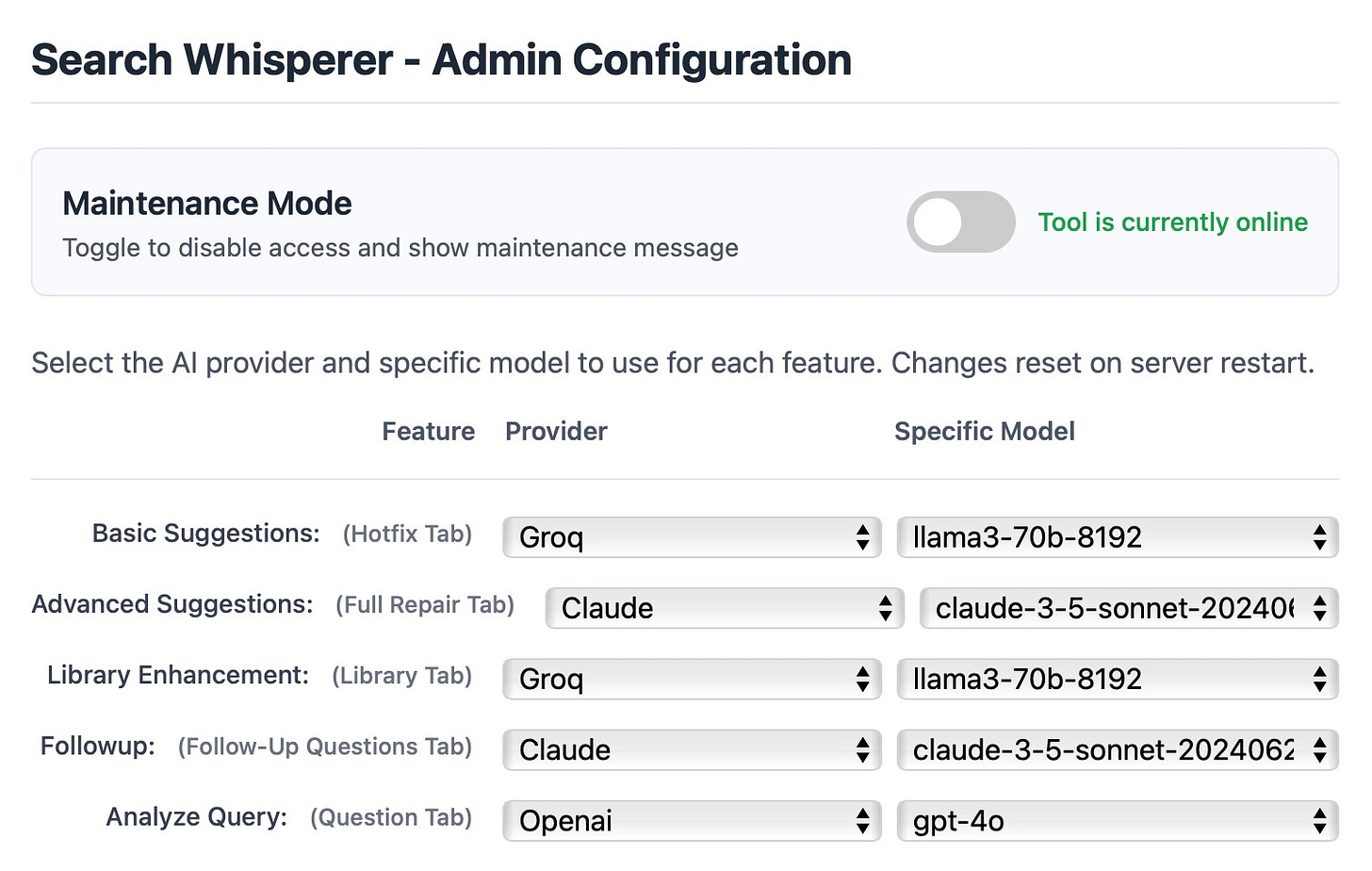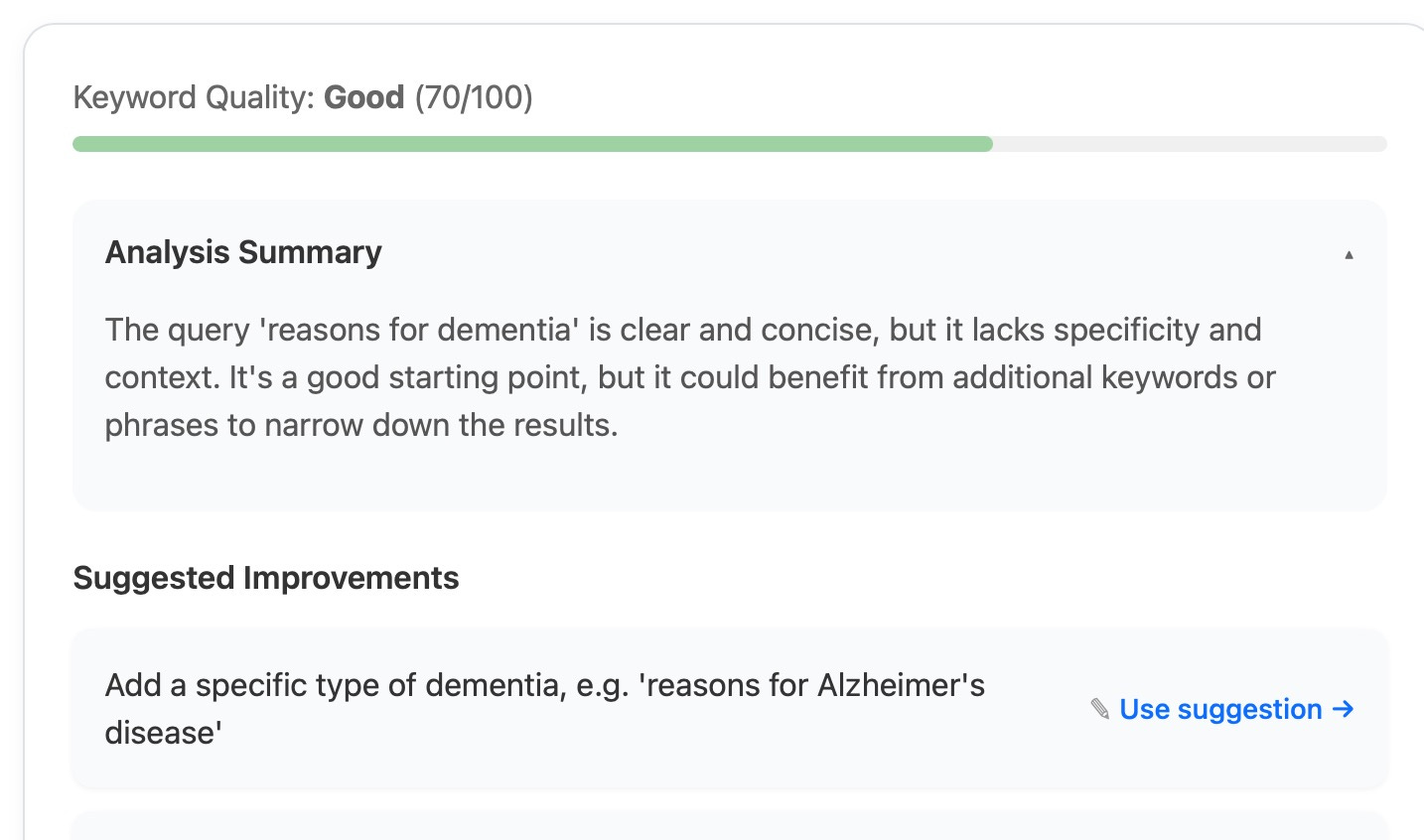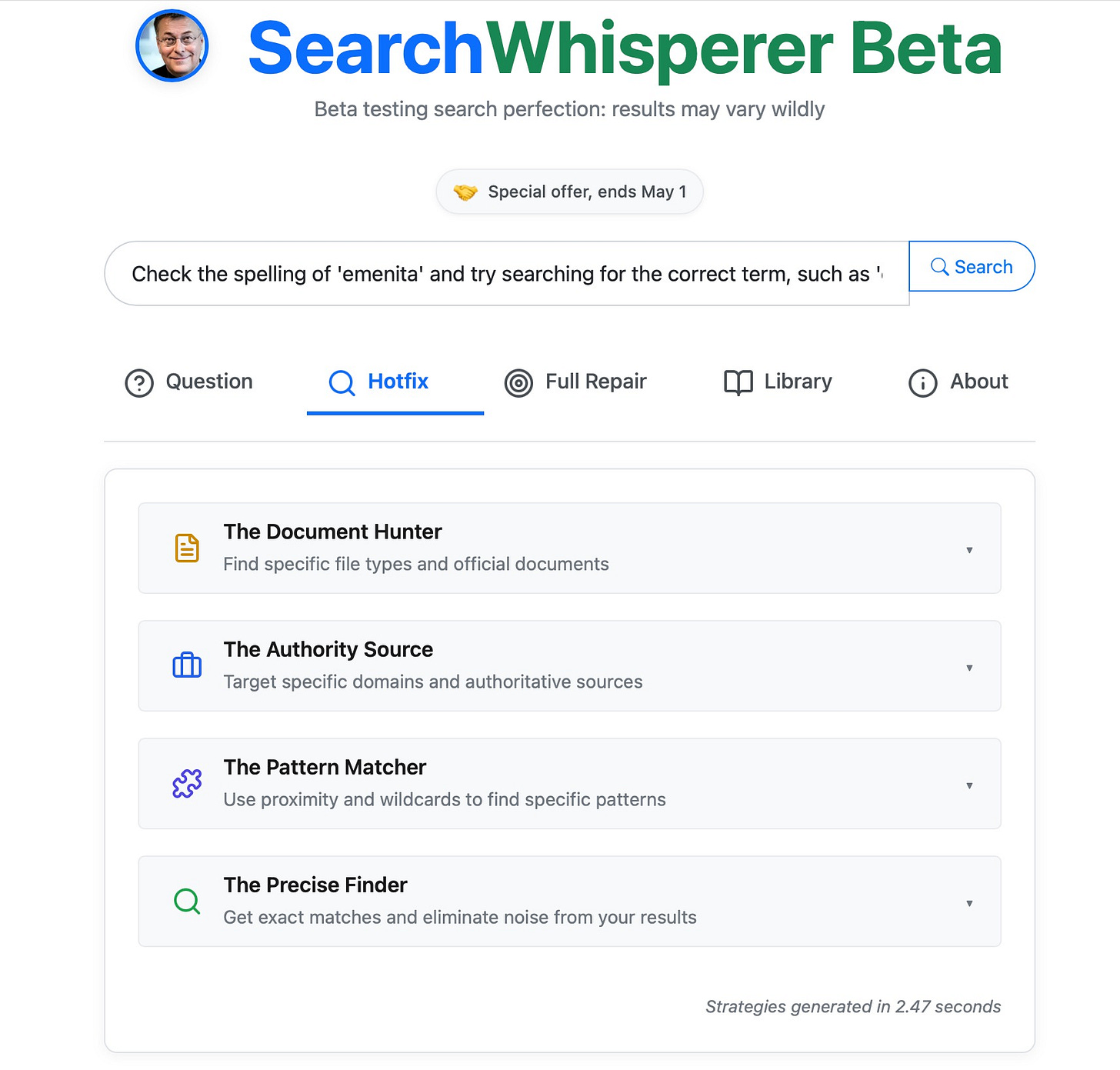Search Whisperer Beta: beating Google's confused algorithm?
37 seconds can transform your garbage queries into information gold
Introducing Search Whisperer Beta: When "jaguar" could mean luxury cars, jungle cats, or a box office disaster, I built this tool to help you outsmart Google's algorithm with precision keywords and search formulas.
Search Whisperer transforms your basic Google searches into precision-targeted queries. This intelligent tool analyzes what you're trying to find and suggests specific keywords, advanced operators (like filetype: or site:), and authoritative sources tailored to your topic. It instantly generates alternative search strategies to help you find exactly what you need.
That's the vision. But like any ambitious project, Search Whisperer Beta starts with small, practical steps. I'm done with building a foundation for the tool, hence the “Beta”.
The current beta successfully orchestrates 4 different large language models working in phases - a significant technical achievement. The query optimization logic still needs refinement. For example, when searching for "social media accounts person X," the system might suggest "social media" AROUND(12) "person X" when a more effective approach would be '"person X" site:linkedin.com (OR) site:facebook.com
The core challenge is teaching the system to think beyond literal keywords from your question. Instead, it needs to predict the words that will actually appear in your desired answer. This requires shifting from basic concept matching to sophisticated query construction that anticipates how information is typically presented.
This approach embodies my long-standing workshop mantra: "think like a document." When you ask a "why" question, the answer probably contains words like "because" or "due to." The key is searching for the language patterns documents use to answer your question, not just the question itself.
Instead of wading through irrelevant pages when you search something ambiguous like "jaguar" or "python," the tool will help you specify exactly what you're looking for and teaches you how to use Google's advanced features to find better information faster.
I spent way too many days cobbling together this Frankenstein's monster of a tool that runs on a bizarre cocktail of my course material, "vibe coding," real-time results from OpenAI, Groq, and Claude, plus some vectorized knowledge bases. It's like I threw every AI I could find into a blender with my own expertise, and somehow the thing actually works
Here's the catch with Search Whisperer Beta: you probably don't know you need it. It's the classic 'you don't know what you don't know' situation. You've been typing into Google for years, getting results, and thinking that's just how search works.
Spoiler alert: it's not. Once you learn to speak Google's secret language and bypass the basic searches everyone else is doing, you'll be amazed at the goldmine of information you've been missing. It's like discovering there's a secret menu at your favorite restaurant—except the restaurant is the entire internet. That’s why I am trying to build a tool that spits uit “Google dorks” and predicts jargon / answers.
The tool needs a hot minute to work its magic. First, you'll wait about 10 seconds while it analyzes just how good your original question was (and trust me, it can be worse than you think).
Then in 5 seconds flat, you get the Hotfix—think of it as search first-aid. Want the full treatment?
The Full Repair takes another 15 seconds tops, giving you ninja-level search operators. And if you're feeling fancy, spend 7 more seconds to feed those shiny new keywords directly into authoritative sources. Is it perfect? No, but you can easily edited some Google dorks out.
Total time investment? About 37 seconds. Which, let's be real, is less time than you'd spend scrolling past SEO garbage to find one decent result with your original crappy search
Here's the dirty little secret about Google: It's not actually that smart. It's basically a really sophisticated pattern-matching machine that's trying to guess what you want based on:
Keywords you use - Which is useless when you don't know the right keywords
What other people clicked on - Which is why you get popular results, not relevant ones
What advertisers paid for - Because capitalism, baby!
SEO manipulation - Where content farms have gamed the system to show you their garbage
The result? You search for "python stuck" and Google gives you:
Snake removal services
Python programming tutorials
A documentary about trapped reptiles in Florida
Google's problem is that it tries to be helpful by guessing what you mean, but it's like your aunt who heard you say "I like plants" and bought you a 6-foot cactus for your studio apartment. The algorithm:
Assumes you're dumb:
It "corrects" your searches even when you meant exactly what you typed
Prioritizes popularity over relevance:
Can't understand context that well:
It doesn't know if you're a programmer, a herpetologist, or just someone with a stuck zipper.
More about Search Whisperer 2.0
1. The Question tab:
"Your search sucks, here's why" (but nicer)
This is where the tool tells you—politely—that searching for "thing that makes coffee but not too hot" isn't going to cut it. It analyzes your query and gives it a score, like a disappointed teacher who still believes in you.
Example: You type "fix computer." The Question tab gently reminds you that this is about as specific as asking a doctor to "fix body."
It's basically saying, "Be specific. The internet isn't psychic."
2. The Hotfix tab:
"Quick, do this instead!"
This is the emergency room of search improvements. It gives you instant alternatives that work RIGHT NOW. Think of it as the search equivalent of duct tape—not perfect, but it'll get you through.
Example: You search "amsterdam travel tips" and Hotfix gives you:
"Amsterdam travel guide 2025 budget"
3. The Full Repair tab:
"Let's get nerdy" (AKA Pro Tips)
This is where we separate the casual Googlers from the search ninjas. Full Repair introduces you to Google dorks (yes, that's the actual technical term, and yes, I find it hilarious too).
Example: Instead of "Python programming tutorials," you get:
filetype:pdf "Python programming" site:edu(University-level content)"Python tutorial" AROUND(5) "beginners" -site:youtube.com(Find tutorials specifically for beginners, but not video content)intitle:"Python cookbook" after:2023(Recent Python guides with 'cookbook' in the title)
It's like giving you the cheat codes to the internet.
4. The Library tab:
"Here Are the Good Websites, You're Welcome"
This is brilliant—instead of making you wade through 50 pages of SEO-optimized garbage, your improved keywords will be digested by authoritative sources. It's like having a librarian who actually knows where all the books are, instead of just shushing people.
Example: For medical queries, you get:
PubMed (for actual research)
Mayo Clinic (for "is this symptom going to kill me?" questions)
CDC (for when you need to win arguments about vaccines)
Plus, it now includes my new AI Research Pilot.
The ability to find accurate, relevant information quickly isn't just convenient—it's power.
People who know how to use search operators have a massive advantage. They find better information faster. They get better answers. They waste less time scrolling through pages of SEO-optimized nonsense.
Will I go bankrupt because each search costs me 15 cents? Maybe. Will I avoid living in a cardboard box because you wonderful people subscribe to my paid newsletter? Also maybe. And hey, if you do subscribe, you'll soon get access to even more tools!








